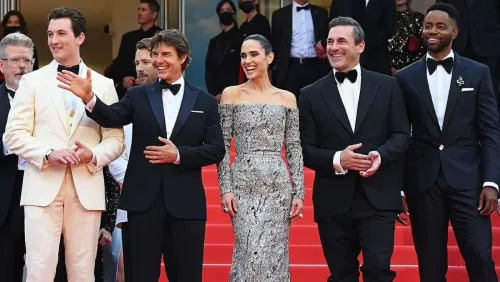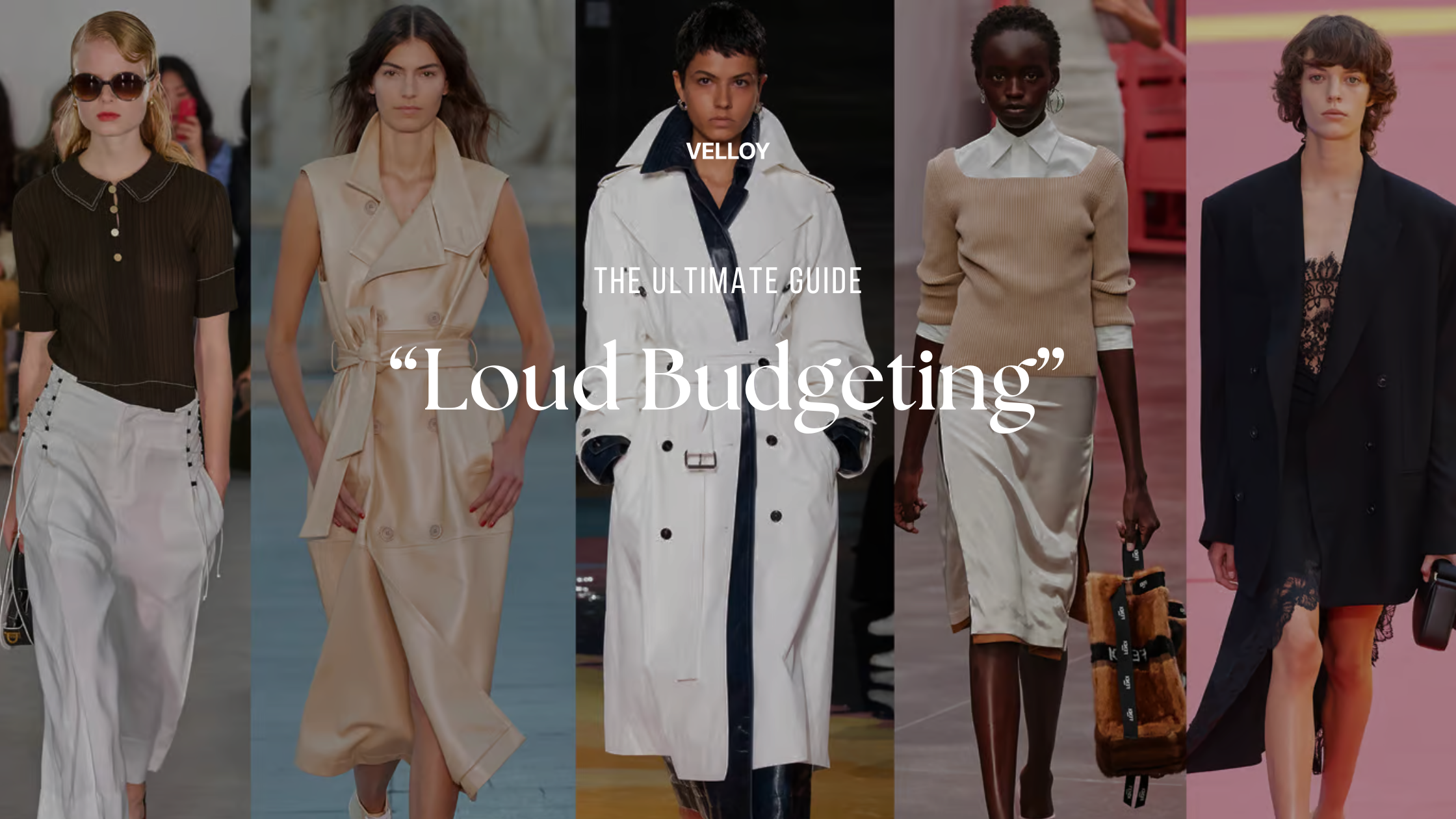Rippling through TikTok and beyond, Loud Budgeting is the financial buzzword of 2024 that's challenging the status quo.
This movement, defined by 'intentional spending' and being unapologetically vocal about it, resonates with a generation seeking authenticity over luxury for its own sake.
In Lukas Battle's humorous words, one of the founders of "Loud Budgeting":
"I don't want to spend money on fuel to hear you talk about your ex for 3 hours."
This perfectly captures its spirit: spend meaningfully and say a resounding 'no' to what doesn't align with your values.
Dive in as we explore why Loud Budgeting is the trend taking TikTok by storm, what it means and how it's shaping the future of personal finance.
What is "Loud Budgeting"?
Here's the definition of loud budgeting as per our luxury expert:
Loud Budgeting: A financial strategy characterised by the vocal and intentional allocation of funds towards personal aspirations and valued experiences, often to friends or family. It prioritises the allocation of resources towards personal goals and future-oriented investments that you value. Most importantly, it involves a conscious decision to reject societal pressures and expectations of conspicuous consumption in favour of personal financial values, meaningful experiences and long-term well-being.
This approach to budgeting marks a significant shift from traditional financial practices and has been provided by luxury expert and commentator Hugo Cannon.
Historically, societal norms have often equated spending with status, where the acquisition of luxury goods was seen as a marker of success.
However, Loud Budgeting challenges this paradigm by encouraging individuals to loudly reject this narrative. It's a movement away from spending to impress or conform and towards spending that aligns with personal values and goals.
Quiet Luxury vs. Loud Budgeting: The Key Shift
"Quiet luxury" or "stealth wealth" are terms often associated with understated but high-end consumption, and have dominated the 2023 landscape in fashion and personal spending for the wealthy.

It was particularly exacerbated by the "succession effect" which highlighted clothes that many thought were basic items Zara items actually cost more than a car.
This concept revolves around acquiring expensive items that don't necessarily scream wealth but are recognized by those 'in the know.' Quiet luxury is subtle, refined, and often goes unnoticed by the general public.
Loud Budgeting, on the other hand, is a stark contrast to this. It's not about the silent acquisition of luxury but about making informed, deliberate choices that align with personal values, irrespective of their societal perception.
This approach is loud not in its display of wealth, but in its declaration of financial independence and intelligence. It's a statement that says, "I choose to invest in my future and in what truly matters to me, rather than what society expects me to."
@lukasbattle Replying to @operelly LOUD BUDGETING IS THE NEW 2024 trend
♬ original sound - Lukas Battle
This shift reflects a broader societal change where individuals are increasingly seeking authenticity and purpose in their lives, including their financial decisions. Loud Budgeting isn't just about refusing to spend on luxury; it's about loudly proclaiming a commitment to personal growth and fiscal responsibility.
It represents a mindset where individuals are not swayed by fleeting trends or peer pressure but are focused on building a financially secure and fulfilling life.
Loud Budgeting in Today's Context
In today's world, where social media often amplifies the allure of luxury and consumption, Loud Budgeting emerges as a counterculture. It's a conscious pushback against the narrative that more spending equals more happiness. Instead, it promotes the idea that true contentment comes from making financial choices that are authentic to one's self and future aspirations.
In summary, Loud Budgeting is more than just a method of managing money; it's a bold statement about one's values and priorities. It's an empowering approach that encourages individuals to take control of their financial narrative, prioritizing long-term satisfaction and well-being over temporary indulgences.
The Philosophy Behind Loud Budgeting: Key Elements
The essence of Loud Budgeting lies in understanding needs vs. wants, making intentional choices, and focusing on long-term financial health. It's a holistic approach to spending, saving, and investing in alignment with your personal values.
Knowing What You Value: Deliberate and Intentional Spending
Lound budgeting is often wrapped up in luxury but there's an important distinction here: you need to make sure you know what you value first.
This approach to finance is not about scrimping and saving out of necessity, but rather choosing to invest in what genuinely matters. It's a conscious decision to bypass the fleeting satisfaction of luxury goods in favour of long-term fulfilment and financial stability.
One of the most compelling aspects of not indulging in luxury spending is the sense of freedom it brings.
Without the burden of keeping up with the latest trends or impressing others with expensive purchases, individuals can focus on what truly brings them joy and satisfaction. This could be anything from investing in personal development, securing a comfortable future, or even contributing to causes they are passionate about.
Experiences Over Goods: The Millennial Shift in Spending
The heart of Loud Budgeting lies in valuing experiences over possessions. This trend, especially prevalent among younger generations, prioritizes memorable experiences and personal growth over material goods. It's about enriching life's journey, not just filling it with things.
This pivotal shift in spending habits, particularly among millennials, of their preference for experiences over goods. This generational change in attitudes towards spending reflects a deeper understanding that happiness and fulfilment often stem more from experiences than from material possessions.
Millennials, and increasingly other generations, are choosing to invest in memories - travel, concerts, workshops, and other life-enriching experiences - rather than accumulating luxury goods. Or if they are - they are sure that they want them, save for them, and value them once they've got it.
This trend dovetails perfectly with the principles of Loud Budgeting. While Loud Budgeting advocates for a mindful approach to spending and a rejection of unnecessary luxury, it also embraces the idea that spending on experiences that align with one's values and bring genuine joy is a worthwhile investment.
This isn't about being frugal at the expense of enjoyment; it's about choosing to allocate resources to activities that offer richer, more meaningful returns in terms of happiness and personal growth.
By prioritizing experiences, individuals practising Loud Budgeting are investing in their happiness and well-being. Whether it's learning a new skill, exploring a new culture, or simply spending quality time with loved ones, these experiences often provide a level of satisfaction that material goods cannot match.
This shift towards experiential spending is a testament to the evolving understanding of what constitutes a fulfilling life, echoing the sentiment that the best things in life aren't things at all.

The Wealthy and Their Approach to Spending
"Rich people hate sending money" - it's more stylish to not spend £10,000 on a Loro Piana coat - Lukas Battle
The attitudes of wealthy individuals towards spending are often misunderstood. Contrary to popular belief, many rich people are quite conservative with their spending habits. They understand that true wealth isn't about how much you spend, but how much you keep and grow. This mindset aligns closely with the principles of Loud Budgeting.
Wealthy individuals often prioritise investments that will appreciate over time, such as real estate, stocks, or even their own businesses. Their spending is calculated and purposeful, with a clear understanding of the value and return of each expenditure.
When they are spending on luxury - this often forms part of a wider and deliberate effort to spend a set percentage of their income (usually from 10-30%) which simply due to their earnings being so high affords luxury goods without them pushing their personal and long-term goals backwards.
Setting Long-Term Goals of Things You Value
Central to Loud Budgeting is the idea of setting long-term goals based on personal values. This requires a deep understanding of what truly matters to you as an individual. It's about asking questions like, "What do I want my life to look like in five, ten, or twenty years?" and "What financial decisions will help me get there?"
Setting these goals involves a level of introspection and honesty about one's desires and aspirations. Whether it's achieving financial independence, owning a home, travelling the world, or funding an education, these goals become the guiding force behind financial decisions.
Loud Budgeting encourages individuals to align their spending with these long-term objectives, ensuring that every dollar spent is a step towards realizing their dreams.
To clarify: it's not that there is something wrong with purchasing luxury items in and of itself. In fact, many people get tremendous joy from their carefully considered and saved-for purchases, whether a lifelong dream handbag or tickets to their favourite artist.
But by focusing on what's truly important, Loud Budgeting empowers individuals to break free from the cycle of consumerism and luxury spending if that are doing it for the wrong reasons.
It's a philosophy that champions financial intelligence and personal fulfilment over societal expectations and superficial appearances. In essence, it's about investing in a future that reflects your true self and values.

Setting Financial Boundaries
Loud Budgeting isn't just about what you spend; it's about what you don't. It's setting clear boundaries against societal pressure to spend on luxury items and choosing investments that align with your future goals. It's about saying 'no' to the unnecessary and 'yes' to financial freedom and independence.
For instance, a huge millennial shift highlighted in the following TikTok shows that actually, people may deeply value time and a good brunch with close friends more than what may have traditionally been a heavy and costly night out drinking.
@maynardvillaflores Brunch in session, today’s meeting is about loud budgeting well yes! ☕️🥐 #brunch #portland #visitportland #travelportland #pdxfood #portlandfood #2024brunch #2024memories #2024intentions #2024visionboard #visionboard
♬ glue song - ・❥・
How to Embrace Loud Budgeting In Life: Key Phrases
Some of our favourite phrases across Tiktok include:
“Put that dollar in your pocket, choose a stock that’s gonna rocket”
On the maximalist side, we have:
I pay a lot of money to be at home. So that’s where I’ll be.
And on the pro-budget side:
Someone said that spending money is an ick in 2024 and now I’m living by that
The Misconception of Wealth: Spending is Money You No Longer Have
A crucial aspect of Loud Budgeting involves addressing and dispelling common misconceptions about wealth, particularly the false equivalence of luxury spending with financial success. This misunderstanding is often perpetuated by the visible displays of wealth in society, such as expensive cars, designer clothes, and lavish lifestyles.
Debunking the Luxury Car Myth
Take, for instance, the often-cited symbol of wealth: the luxury car.
Remember: when you see someone driving a Lamborghini an expensive car, it's $200,000 that they no longer have in their possession.
A common misconception is that owning a high-end vehicle like a $200,000 Lamborghini signifies wealth. However, Loud Budgeting challenges this notion by highlighting a different perspective: when you see someone with expensive things, this is money they no longer have. This approach emphasizes the importance of asset accumulation over conspicuous consumption.
Resisting the Urge to Conform
Another key aspect of Loud Budgeting is resisting the urge to conform to societal pressures of luxury spending. This involves making intentional choices about how and where to spend money, based on personal values rather than external expectations. It's about creating a personal financial plan that reflects individual priorities and goals, rather than a desire to keep up with societal trends or peer influences.
In summary, section 4 of the blog post on Loud Budgeting challenges the traditional indicators of wealth and encourages readers to adopt a more meaningful approach to financial success. It emphasizes the importance of asset accumulation, setting value-based long-term goals, and resisting societal pressures in pursuit of true financial well-being.
Loud Budgeting: 2024’s Biggest Trends
Emerging from the digital era, particularly platforms like TikTok, Loud Budgeting reflects a cultural shift. It's a response to the over-glamorization of luxury and a move towards more authentic, value-driven financial decisions.
As we delve into 2024, it's clear that Loud Budgeting is not just a fleeting fad but a trendsetting revolution in the world of personal finance and ultimately people’s happiness.
This approach, which emphatically prioritizes personal values and long-term financial goals over the allure of luxury spending, is rapidly gaining traction. Here's why Loud Budgeting is uniquely positioned to be one of the biggest trends of 2024, and why it's capturing the attention of both everyday users and journalists alike.
- Cultural Resonance in a Post-Pandemic World: The aftermath of the global pandemic has fundamentally altered consumer priorities. People are increasingly seeking meaningful, value-driven lifestyles, and Loud Budgeting speaks directly to this shift. It's about making financial choices that reflect a deeper understanding of what truly matters in life - a concept that's resonating strongly in our current cultural climate.
- Economic Realities Driving Change: The economic landscape has been reshaped by global events, leading to a heightened awareness of financial security and stability. Loud Budgeting, with its emphasis on prudent spending and investing in the future, is a response to these changing economic conditions. It offers a blueprint for financial resilience, appealing to a wide audience looking to navigate these uncertain times.
- Digital Influence and Social Media Narratives: In an era where social media heavily influences perceptions of success and wealth, Loud Budgeting emerges as a counter-narrative. It challenges the conventional portrayal of affluence and luxury, advocating for a more authentic and sustainable approach to personal finance. This aspect of Loud Budgeting is particularly appealing to journalists and content creators, who are always on the lookout for stories that challenge the status quo.
- Sustainability and Ethical Spending: The growing emphasis on sustainability and ethical living aligns perfectly with the principles of Loud Budgeting. This approach encourages thoughtful spending that considers not only personal benefit but also the broader impact on society and the environment. This alignment with contemporary values makes Loud Budgeting a particularly relevant and attractive topic for 2024.
- A Universal Appeal: One of the most compelling aspects of Loud Budgeting is its universal appeal. It transcends age, income levels, and backgrounds, offering a flexible and adaptable approach to personal finance. This broad appeal is a key reason why Loud Budgeting is poised to dominate discussions around personal finance in 2024.
Conclusion
Loud Budgeting is more than a financial strategy; it's a lifestyle choice that champions financial intelligence and personal fulfilment. It's a call to redefine our relationship with money, focusing on what truly matters for a fulfilling and financially secure life.
The benefits of Loud Budgeting are multifold: greater financial security, reduced stress from living within means, and the satisfaction of aligning spending with personal values. It's a strategy that pays dividends in peace of mind and financial stability.
Adopting Loud Budgeting involves embracing key phrases and mindsets like "value over vanity" and "purpose over price." It's a conscious choice to make financial decisions that resonate with personal beliefs and long-term aspirations - even if you do decide that you really want that trip to Hawaii, you'll be happier for getting the goal and deciding that's what you really want.
FAQs
What is Loud Budgeting?
Loud Budgeting (noun): A financial strategy characterised by the vocal and intentional allocation of funds towards personal aspirations and valued experiences, often to friends or family. It prioritises the allocation of resources towards personal goals and future-oriented investments that you value. Most importantly, it involves a conscious decision to reject societal pressures and expectations of conspicuous consumption in favour of personal financial values, meaningful experiences and long-term well-being.
What are the benefits of Loud Budgeting?
The benefits of Loud Budgeting are multifold: greater financial security, reduced stress from living within means, and the satisfaction of aligning spending with personal values. It's a strategy that pays dividends in peace of mind and financial stability.
Challenges and Misconceptions
The main challenge in Loud Budgeting is overcoming the entrenched mindset of equating luxury with success. It requires a paradigm shift to view intentional spending as smart, not stingy.







